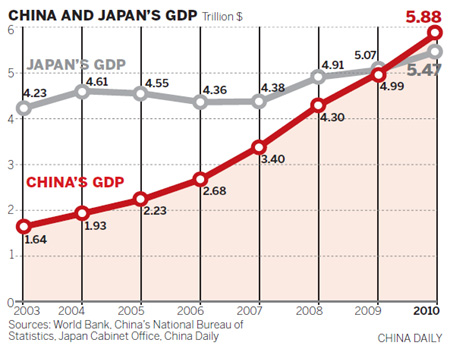Caution as economy overtakes Japan's

China still has a long way to go to improve its economy, despite formally overtaking Japan as the world's second largest economy, experts said.
Japan's gross domestic product (GDP) reached $5.47 trillion last year, compared to $5.88 trillion for China, Japan's Cabinet Office said on Monday.
Japan became the world's second largest economy, after the United States, in 1968 on the back of its post-war recovery.
China overtook Germany in 2007 to become the world's third biggest economy.
"It is not a surprise that China overtook Japan," said Lu Zhengwei, senior economist with the Shanghai-based Industrial Bank.
However, economists pointed out that China's per capita GDP was only about 10 percent of Japan's.
"We should not overestimate our GDP figure as China's population is 1.3 billion, 10 times bigger than Japan's," said Yi Xianrong, economist at the Chinese Academy of Social Sciences, a top think tank.
China's per capita GDP was about $4,300 in 2010, and income levels have been falling behind economic growth for years.
Ma Jiantang, head of the National Bureau of Statistics, said in January that the country has a huge population, a weak economic foundation, few resources and many people are mired in poverty.
"Therefore, while we take note of our expanding economic size and strength, we should also soberly understand that China remains a developing nation."
The World Bank estimates that more than 100 million Chinese people - nearly the size of Japan's entire population - live on less than $2 a day.
The China Youth Daily described China's expansion as an "empty happiness" as the country's economic development was at the expense of cheap labor and environmental degradation, while the quality of life, including education, social security and healthcare, still lags far behind developed countries.
Yuan Gangming, research fellow at the Center for China in the World Economy at Tsinghua University, said that in the next three to five years, China is likely to maintain a growth rate between 8 and 10 percent.
However, for an improved quality of life and healthy, sustained growth, the country must invest more in areas such as human resources, the underdeveloped western regions, and social security, he said.
Zheng Xinli, permanent vice-chairman of China Center for International Economic Exchanges, also said the country should continue its reforms and improve its economic structure to avoid the "middle-income trap".
The term was coined by the World Bank to describe stagnation in a country when its per capita GDP reached $3,000.
"In the past 30 years, China developed because of reform and opening-up. In the coming two decades, we need more reforms to further unleash the potential of development," he said.
He predicted urbanization will be the biggest driving force for China's economy.
One person moving into a city can create economic value of 100,000 yuan, he said. In the next 10 years, 200 million Chinese people will move into cities and towns, with a potential to add 20 trillion yuan to the economy over the decade, he estimated.
Sustained economic growth in China also helps other economies in the world, including Japan.
The Japanese Economic and Fiscal Policy Minister Kaoru Yosano said: "We welcome China's economic advancement as a neighboring country," according to Kyodo News.
Japan's economy has benefited from China's rapid growth, initially as businesses shifted production here to take advantage of lower costs, and as local incomes rose, by tapping an increasingly lucrative market for Japanese goods.
 0
0 







Go to Forum >>0 Comments